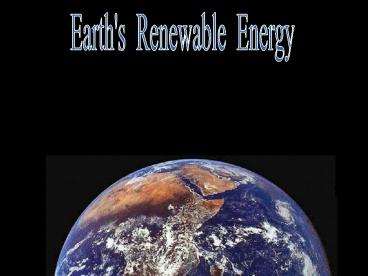Earth - PowerPoint PPT Presentation
1 / 15
Title: Earth
1
Earth's Renewable Energy
Our Alternatives to Fossil Fuels
2
History of Wind Energy
Since early recorded history, people have been
harnessing the energy of the wind. Wind energy
propelled boats along the Nile River as early as
7000 BP. By 2200 BP, simple windmills in China
were pumping water, other windmills with woven
reed sails were grinding grain in Persia and the
Middle East. Wind is actually a form of solar
energy, when you think about it.
3
Wind
Wind can be used to generate mechanical energy
(when you can use kinetic, or potential energy to
do something physical) and electrical energy
The Betz Law There is the little piece of bad
news called the Betz' law. Back in 1919 a German
physicist named Albert Betz figured out that the
most you can possibly get out of wind turbine is
around 59 of the power in the wind. This is an
unassailable bit of physics.
4
How Does A Turbine Work?
First, wind speeds must exceed 12 mph in order
for the turbine to even turn
- Wind turns the rotor (blades)
- This rotates the shaft which runs through the
housing nacelle
- Inside the gearbox, the slow rotation is
switched to a higher speed through the work of
gears
- The brake slows it if the wind is blowing too
fast.
- The generator turns the mechanical energy into
electricity
A battery stores the energy for future use.
5
Wind Potential in Texas
Altamont Pass, just east of San Francisco,
Californiaa very windy place!
This was the first wind farm in Texas. The Texas
Wind Power Project, located in Culberson County
in West Texas, has 112 wind turbines capable of
generating 35 megawatts of electricity -- enough
to power 12,000 to 15,000 homes.
6
Water
Moving water can be used to produce mechanical
and electrical energy
- Energy generated using water is known as
hydroelectric power
The technology we use to harness hydroelectricity
is
The TURBINE!!!
The water turbine has an efficiency rating of
nearly 90!
7
Prior to the invention of steam power during the
Industrial Revolution, wind and water were the
only sources of widespread alternative power.
Run of river plants rely on seasonal flow, and
are sometimes unreliable.
Water behind a dam represents potential energy,
and when we release it through the penstock which
ends with a turbine, it produces electricity.
8
How The Water Turbine Works
When the sluice is closed, the reservoir
represents a huge potential energy source.
9
Ocean Energy
The ocean can produce two types of energy
thermal energy from the sun's heat, and
mechanical energy from the tides and waves.
Since Oceans cover more than 70 of Earth's
surface, this makes them the world's largest
solar collector. Just a small portion of the heat
trapped in the ocean could power the world.
- Ocean thermal energy (OTEC) is used for many
applications, including electricity generation.
There are three types of electricity conversion
systems Closed, Open, and Hybrid. - Closed-cycle systems use the ocean's warm
surface water to vaporize a working fluid, which
has a low-boiling point, such as ammonia.
10
- Open-cycle systems actually boil the seawater by
operating at low pressures. This produces steam
that passes through a turbine/generator. - And hybrid systems combine both closed-cycle and
open-cycle systems.
BonusThe steam condenses within the heat
exchanger and provides desalinated water in both
open, and hybrid systems.
Since the cost of desalination for potable water
is extreme, this would tend to kill two birds
with one stone!
11
OTEC platform and pipeline in the Indian Ocean
There must be a differential of 36 F (20 C)
between floor and surface, for this option to
work. This is why many OTEC platforms are located
in tropical regions
12
OTEC Facts
- Water near the surface of one square mile of the
ocean absorbs more heat from the sun than can be
produced by burning 7,000 barrels of oil
- The amount of solar energy absorbed per day in
the tropical oceans is more than 10,000 times the
amount of heat content of the oil consumed daily
in the United States
- Could be a viable, virtually inexhaustible
supply of energy for future generations.
- Imagine what the development of this technology
would mean to OPEC (organization of the petroleum
exporting countries) and economics in general
13
The Power of Waves
Ocean mechanical energy is quite different from
ocean thermal energy. Even though the sun affects
all ocean activity, tides are driven primarily by
the gravitational pull of the moon, and waves are
driven primarily by the winds. As a result, tides
and waves are intermittent sources of energy,
while ocean thermal energy is fairly constant.
Wave energy plants are small, but can be used to
power warning buoys and lighthouses.
- Huge potential, but still experimental
14
The Power of Tides
Tides can be harnessed to produce energy
An increase of 16 feet from low to high tide is
needed to make this a viable, cost efficient
option.
Tidal Energy Plant in Rance Estuary, France
Newer models are more promising, however, tidal
energy still doesnt get the attention of wind
and solar.
15
Potential global sites for the use of tidal
energy are extremely limited.































